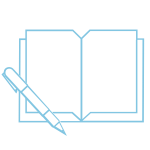Express yourself in a journal
Since the dawn of writing, people have written about their own lives—recording their most meaningful thoughts and feelings. In recent years, journaling—the practice of keeping a personal journal—has been touted for its purported therapeutic effects. Not only can it help the journaler gain insight and a better understanding of his or her inner self, it’s a good way of releasing pent-up emotions such as hurts, frustrations and anger, which can have a stress-reducing effect. Expressing yourself through writing can also help provide clarity and perspective on any number of situations.
For those who are going through psychiatric drug withdrawal, keeping a journal may offer specific benefits. If you’re prone to feeling that you’re distanced from others or the world, or if you sometimes experience a sense of disconnect or unreality, writing down your thoughts can have a grounding effect. Being able to look back on your writings can be helpful if you experience some memory impairment, which is a common withdrawal symptom. Writing in a journal also allows you to track tendencies, patterns, and self-growth over time. By flipping back to times when you previously faced obstacles and dilemmas, you might be reassured by realizing that these issues have since been resolved.
Even if you already keep a taper journal and/or a symptoms journal, having a more expansive personal journal on hand may provide valuable insight as you navigate your withdrawal journey. (You can learn more about keeping a taper journal by working through TWP’s Companion Guide to Psychiatric Drug Withdrawal )
Here are a few tips that may be of use:
- To get started, obtain a journal that is visually pleasing to you. It doesn’t have to be fancy—while some people like to write in an elegant bound book, others are more comfortable with an inexpensive spiral notebook.
- Some people find that writing by hand is more therapeutic than keyboard typing. But if you prefer not to hand-write, there are many digital options, from keeping your own simple Word file online to using one of the writing and journaling apps that are now available.
- Write about whatever comes to mind. You can write about what is going on in your life: your hopes, your fears, your aspirations, your relationship with a friend, a family member—whatever matters to you.
- If you find it difficult to begin, sometimes doodling and drawing can be useful in getting started, to get the creative juices flowing.
- Some people start off by simply making a list of things to be grateful for.
- You don’t need to be scholarly or profound—just write whatever comes to mind.
- Don’t edit your writing. You’ll break the intuitive, natural flow of your thoughts. And since this is not an academic exercise, spelling mistakes and punctuation are unimportant.
- Feel free to be versatile and add photographs, drawings, letters, or other scrapbook items to your journal. If you wish, write about their significance.
- You might also choose to use different colors to represent different moods.
- Be sure to write down your successes. If you’re experiencing psychiatric drug withdrawal, write about any improvements you notice. When you’re having a relatively good day, write about it in great detail, so you can refer to it on the days when you need reassurance.
- Find a safe, secure place to keep your journal. If it’s digitally stored, make sure it’s password protected. This will help you feel free to write your deepest, most private thoughts without worrying that they will be discovered.

Journaling
Express yourself in a journal
Since the dawn of writing, people have written about their own lives—recording their most meaningful thoughts and feelings. In recent years, journaling—the practice of keeping a personal journal—has been touted for its purported therapeutic effects. Not only can it help the journaler gain insight and a better understanding of his or her inner self, it’s a good way of releasing pent-up emotions such as hurts, frustrations and anger, which can have a stress-reducing effect. Expressing yourself through writing can also help provide clarity and perspective on any number of situations.
For those who are going through psychiatric drug withdrawal, keeping a journal may offer specific benefits. If you’re prone to feeling that you’re distanced from others or the world, or if you sometimes experience a sense of disconnect or unreality, writing down your thoughts can have a grounding effect. Being able to look back on your writings can be helpful if you experience some memory impairment, which is a common withdrawal symptom. Writing in a journal also allows you to track tendencies, patterns, and self-growth over time. By flipping back to times when you previously faced obstacles and dilemmas, you might be reassured by realizing that these issues have since been resolved.
Even if you already keep a taper journal and/or a symptoms journal, having a more expansive personal journal on hand may provide valuable insight as you navigate your withdrawal journey. (You can learn more about keeping a taper journal by working through TWP’s Companion Guide to Psychiatric Drug Withdrawal )
Here are a few tips that may be of use: